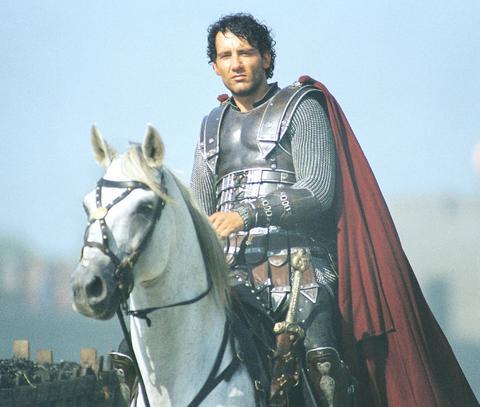King Arthur claims to be "the untold true story that inspired the legend." In the name of accuracy, apparently, some familiar legendary elements have been altered or dropped altogether. Merlin (Stephen Dillane), it turns out, was not a magician but the shadowy leader of the Woads, a guerrilla army of Pictish freedom fighters with stringy hair, blue faces and tattooed bodies. Since the knights of the Round Table are stubbornly pagan (and skeptical of their leader's Christianity, which is wobbly at best), they are not about to go off in search of the Holy Grail.
And though Lancelot (Ioan Gruffudd) at one point casts a smoldering glance in the direction of Guinevere (Keira Knightley), nothing more comes of the mythic triangle of king, queen and knight. Lancelot, in any case, is more of a fighter than a lover, and so, in spite of an obligatory cuddle with Arthur on the night before the big battle, is Guinevere.
Historians will debate the veracity of all this, assuming they have nothing better to do. But it will be clear to most moviegoers that this true story, far from being untold, was inspired by at least a half-dozen previous movies, from The Seven Samurai to Braveheart.

PHOTO COURTESY BVI
David Franzoni, the screenwriter, also wrote Gladiator, and Clive Owen's Arthur, like Russell Crowe's Maximus, both faithfully serves the Roman empire and turns against its authoritarian abuses. He and his knights are sent on a rescue mission that recalls the one undertaken by Bruce Willis in Tears of the Sun, the previous movie directed by Antoine Fuqua, who directed King Arthur.
Really, though, originality is not the point of this movie, any more than historical verisimilitude is. It is a blunt, glowering B picture, shot in murky fog and battlefield smoke, full of silly-sounding pomposity and swollen music (courtesy of the prolifically bombastic Hans Zimmer). The combat scenes are no more coherent than the story, which requires almost as much exposition as the last Star Wars movie. Luckily there is an element of camp that prevents King Arthur from being a drag.
In this version Arthur's knights are a ragged band of foreign conscripts stationed in the shadow of Hadrian's Wall, where they fight an occasional skirmish with the pesky Woads, who gyre and gimble in the wabe. Arthur's mixed parentage -- he is half Roman and half British -- results in an identity crisis as he simultaneously grows disillusioned with the corruption and cruelty of Rome and succumbs to Guinevere's Woady charms.
Arthur's men, for reasons efficiently explained in the first 10 minutes of the movie, are required to serve the empire for 15 years. Cerdic, the Saxon leader, is played by Stellan Skarsgard, whose halting, throaty delivery and gleefully hammy villainy confirm his stature as the Swedish Christopher Walken. Cerdic's lieutenant is his son Cynric (Til Schweiger), who sports a spiffy plaited soul patch and a slightly different accent, and who leads the Saxons into a battle on the ice that is the film's most original and satisfying set piece. The rest of it is mostly grunting, roaring and hacking, conducted by some fine, cheerfully slumming actors, notably Ray Winstone (as a lusty, cantankerous knight named Bors) and Mads Mikkelsen (as the enigmatic Tristan).

On April 26, The Lancet published a letter from two doctors at Taichung-based China Medical University Hospital (CMUH) warning that “Taiwan’s Health Care System is on the Brink of Collapse.” The authors said that “Years of policy inaction and mismanagement of resources have led to the National Health Insurance system operating under unsustainable conditions.” The pushback was immediate. Errors in the paper were quickly identified and publicized, to discredit the authors (the hospital apologized). CNA reported that CMUH said the letter described Taiwan in 2021 as having 62 nurses per 10,000 people, when the correct number was 78 nurses per 10,000

As we live longer, our risk of cognitive impairment is increasing. How can we delay the onset of symptoms? Do we have to give up every indulgence or can small changes make a difference? We asked neurologists for tips on how to keep our brains healthy for life. TAKE CARE OF YOUR HEALTH “All of the sensible things that apply to bodily health apply to brain health,” says Suzanne O’Sullivan, a consultant in neurology at the National Hospital for Neurology and Neurosurgery in London, and the author of The Age of Diagnosis. “When you’re 20, you can get away with absolute

May 5 to May 11 What started out as friction between Taiwanese students at Taichung First High School and a Japanese head cook escalated dramatically over the first two weeks of May 1927. It began on April 30 when the cook’s wife knew that lotus starch used in that night’s dinner had rat feces in it, but failed to inform staff until the meal was already prepared. The students believed that her silence was intentional, and filed a complaint. The school’s Japanese administrators sided with the cook’s family, dismissing the students as troublemakers and clamping down on their freedoms — with

As Donald Trump’s executive order in March led to the shuttering of Voice of America (VOA) — the global broadcaster whose roots date back to the fight against Nazi propaganda — he quickly attracted support from figures not used to aligning themselves with any US administration. Trump had ordered the US Agency for Global Media, the federal agency that funds VOA and other groups promoting independent journalism overseas, to be “eliminated to the maximum extent consistent with applicable law.” The decision suddenly halted programming in 49 languages to more than 425 million people. In Moscow, Margarita Simonyan, the hardline editor-in-chief of the